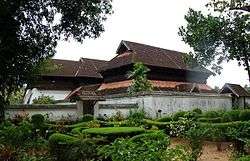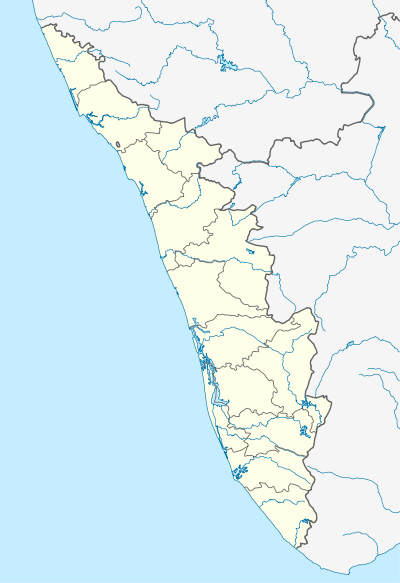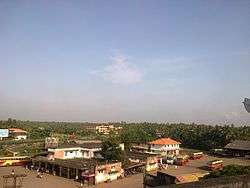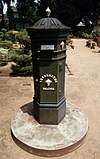Kayamkulam
Kayamkulam is a municipal town in Alappuzha district of Kerala in Indian state. Located on the western coast of India, it was an ancient maritime trading centre. One of the largest thermal power plants in Kerala, the Rajiv Gandhi Combined Cycle Power Plant run by the NTPC, is situated in Kayamkulam.
Kayamkulam Irravipattanam | |
|---|---|
 Krishnapuram Palace | |
 Kayamkulam Location in Kerala, India  Kayamkulam Kayamkulam (India) | |
| Coordinates: 9.172°N 76.501°E | |
| Country | |
| State | Kerala |
| District | Alappuzha |
| Government | |
| • Type | Municipality |
| • Body | Municipal Council |
| • MLA | U Prathiba Hari |
| Population (2001) | |
| • Total | 68,634 |
| Languages | |
| • Official | Malayalam, English |
| Time zone | UTC+5:30 (IST) |
| PIN | 690502 |
| Telephone code | +91-479 |
| Vehicle registration | KL-29 |
| Nearest city | Kollam (37 km) |
| Sex ratio | 0.944 ♂/♀ |
| Literacy | 81.76%% |
Krishnapuram Palace is located nearby. Many old cashew factories can also be seen in the locality.
History
Kingdom of Kayamkulam
Kayamkulam was a medieval feudal kingdom, known as odanadu, ruled by the Kayamkulam Rajas, with their royal palaces at Eruva and Krishnapuram. Maha raja Marthanda Varma (1706–58) conquered kayamkulam and annexed its territories to Travancore. It is said that the kingdom of Kayamkulam had a huge army led by a valiant commander Yeruvayil Achutha Warrier and therefore the large army of Travancore attempted three times before they succeeded in capturing Kayamkulam. The present day palace was built in its place by Marthanda Varma after he annexed Kayamkulam to Travancore.
Kayamkulam, Mavelikkara and Karunagappally were previously known as Onattukara.
Kayamkulam had slave markets in the 17th century.
Tourist attractions
The Krishnapuram Palace, built in the 18th century, now functions as a museum. Constructed in typical Kerala-style architecture, it has the largest mural painting in Kerala.[1] Also, this palace museum at Krishnapuram houses the famous Kayamkulam double-edged sword.[2]
Cartoonist Sankar Memorial National Cartoon Museum and Art Gallery, is the first of its kind in the state and would be elevated to the ‘top cartoon study centre’ in the country.
Kayamkulam Lake is a part of the Kerala backwaters tourist map. The Kayamkulam Boat Race[3] is held on the fourth Saturday of August every year.[4] The famous Chinese fishing nets can be found on the banks of the lagoon.
Azhikkal Beach (Aayiram Tengu) and Valiya Azhikkal beach (Kochiyude Jetty) have gained popularity as tourist locations.
Transport
Kayamkulam is well connected by road and rail network. Besides this, Alappuzha-Kollam boat service runs via Kayamkulam.

Roads
NH66 passes through Kayamkulam, which conveniently connects it to the major cities Alappuzha, Kochi, Thiruvananthapuram, Thrissur, Kollam, Palakkad and Coimbatore. The Kayamkulam-Punalur (KP) road is a major road connecting it to the eastern parts of the State. The KSRTC Bus Station[code KYLM] lies very near to the national highway and is one of the biggest bus stations of KSRTC in terms of total area. All the KSRTC buses have halt at Kayamkulam Bus station. The new Railway Terminal Bus Stand near Kayamkulam Railway Station is an interlink between railway and road transport.
Railways
Kayamkulam Junction railway station(Kayankulam Jn) [code KYJ] is a major railway junction situated 1.5 km from the town on the K.P. Road. Trains from the North from Ernakulam via Kottayam, and from Ernakulam via Alappuzha pass through Kayamkulam Junction and then proceed to Kollam, Thiruvananthapuram and further to Nagercoil and Kanyakumari.

Demographics
As of 2001 India census,[5] Kayamkulam has a population of 65,299. Males constitute 49% of the population and females 51%. Kayamkulam has an average literacy rate of 82%, higher than the national average of 59.5%: male literacy is 84%, and female literacy is 79%. In Kayamkulam, 11% of the population is under 6 years of age.
Civic administration
Kayamkulam assembly constituency is part of Alappuzha (Lok Sabha constituency).[6]
Educational and research institutes
The Central Coconut Research Station (CCRS) at Kayamkulam was established in 1948, as a field station of the erstwhile Agricultural Research Laboratory. Presently, it is a regional station of the Central Plantation Crops Research Institute (CPCRI).[7]
KPAC drama troupe
Kerala People's Arts Club (KPAC) is a theatrical movement in Kayamkulam, Kerala. It was formed in the 1950s by a group of individuals having close ties with the Left-wing political parties of Kerala. This political theatre was very influential in propagating communist ideas in Kerala.

In 1951 KPAC staged its first drama, Ente Makananu Sari (My Son is Right). The songs of this play were written by Punaloor Balan. Its second drama Ningalenne Communistakki (You Made Me a Communist), first performed in 1952, became a path-breaking play in the history of Malayalam theatre. The play was penned by the renowned playwright Thoppil Bhasi, under the pseudonym Soman. Bhasi was underground when he wrote the play. The success of Ningalenne Communistakki brought KPAC to the forefront of a powerful people's theatre movement in Kerala.[8]
KPAC played a significant role in popularising the Communist Party in Kerala through its dramas, road shows and kathaprasangams (story telling).[9]
Power plant
The Rajiv Gandhi Combined Cycle Power Plant (also known as Rajiv Gandhi CCPP Kayamkulam or NTPC Kayamkulam) is a combined cycle power plant located at Kayamkulam, Alappuzha district, Kerala. The power plant is owned by NTPC Limited. The power plant is fueled by imported and indigenous naphtha. Source of the cooling water is Achankovil river. There is a plan to expand the plant by three units with capacity of 350 MW each. New units would be fueled by re-gasified liquefied natural gas.
Notable people
- Thopil Bhasi - Malayalam playwright, screenwriter, and film director; associated with the communist movement in Kerala; founder of Kerala Peoples Arts Council (KPAC)
- Dr. K. M. Cherian - heart surgeon; founder of Frontier Lifeline Hospital and the Dr K M Cherian Heart Foundation
- Kambisseri Karunakaran - journalist, politician, actor, satirist and rationalist
- P. Kesavadev - novelist and social reformer; wrote speeches, autobiographies, novels, dramas, short stories, and films
- Kayamkulam Kochunni - highwayman based in Kayamkulam, active in Central Travancore in the early 19th century; said to have stolen from the rich and given to the poor; died in jail in 1859.
- K. P. A. C. Lalitha - National Award-winning Indian film and stage actress
- B. S. Manoj - Author, Academician, and Scientist
- Prof. S. Guptan Nair - Malayalam writer, critic, scholar and educationist
- P. Padmarajan - author, screenwriter, and film director; known for works in Malayalam literature and Malayalam cinema; founder of a new school of filmmaking in Malayalam
- Muthukulam RaghavanPillai - dramatist, poet, screenplay writer and actor
- Resul Pookutty - Oscar-winning Indian film sound designer, sound editor and mixer
- Thachadi Prabhakaran - former Minister of Kerala
- Cartoonist Shankar (K. Shankara Pillai) - founder of Shankar's Weekly; awarded Padma Vibhushan in 1976; set up Children's Book Trust and Shankar's International Dolls Museum
- Kayamkulam Philipose Ramban - Christian priest; lived in Kayamkulam in the 19th century; translated Bible into the vernacular language Malayalam for the first time
- T. P. Sreenivasan - diplomat; former High Commissioner to Fiji and Kenya and Ambassador to Austria
- Dr.Cheravally Sasi - Malayalam poet, lyricist and historian who is the author of 'Odanadinte Ulthudipukal' - cultural history of Odanadu
- Kayamkulam Kochunni - Social worker, Robinhood of Kerala; lived in Kayamkulam in the 19st century.
See also
References
| Wikimedia Commons has media related to Kayamkulam. |
- Lonely Planet Things to do in Southern Kerala by Lonely Planet travellers.
- Department of Archeology WebsiteArchived 2011-01-22 at the Wayback Machine.
- First Kayamkulam boat race.
- Kerala boat races Archived 28 June 2012 at the Wayback Machine.
- "Census of India 2001: Data from the 2001 Census, including cities, villages and towns (Provisional)". Census Commission of India. Archived from the original on 16 June 2004. Retrieved 1 November 2008.
- "Assembly Constituencies - Corresponding Districts and Parliamentary Constituencies" (PDF). Kerala. Election Commission of India. Archived from the original (PDF) on 4 March 2009. Retrieved 20 October 2008.
- "Frontline article". Archived from the original on 30 December 2001. Retrieved 2 October 2016.
- "First Ministry of Kerala Government". Archived from the original on 2 October 2008. Retrieved 2 October 2016.
